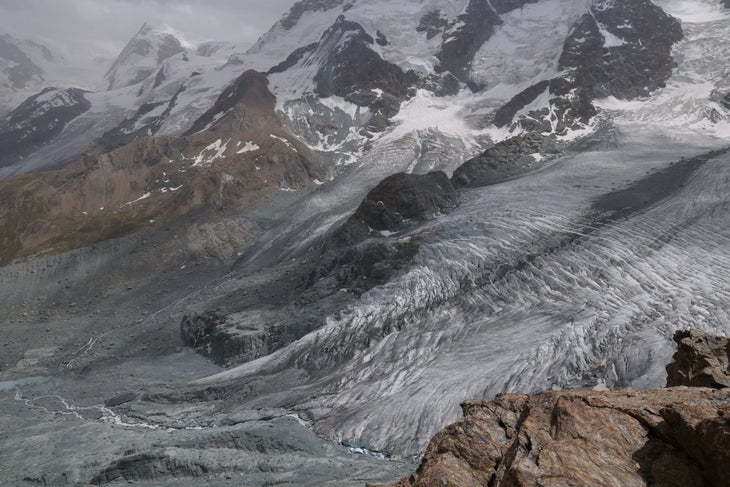Products You May Like
Get full access to Outside Learn, our online education hub featuring in-depth fitness, nutrition, and adventure courses and more than 2,000 instructional videos when you sign up for Outside+
Sign up for Outside+ today.
The heat wave smothering Europe continues to wreak havoc across the continent’s summer glacier skiing scene. Today (July 29) Zermatt, long considered one of the most snow-sure resorts thanks to its elevation and snowpack, put skiing on hold until cooler temperatures return.
Also Read: This Ski Area Understands Climate Change, So It Turned a Coal Mine Into a Power Plant
While unimpressive snowfall plagued the 2021-’22 season, putting summer ops in a less-than-ideal situation, the death knell for Zermatt’s glacier skiing came after a series of rain storms above 13,000 feet compromised the snow. According to Zermatt management, the summer season began with snowpack 20 feet below average, and the rain contributed to crevasses growing on the glacier, making it unsafe to ski until more mitigation can be completed.
The glacier, which boasts the highest elevation lift-served skiing in Europe, is typically open year-round and is an important training ground for myriad ski teams. It’s also host to a couple of early-season World Cup races in late October and early November, preparation for which will continue despite the closure. Nearby Saas Fee, where Mikaela Shiffrin and other U.S. Ski Team members have been training, remains open but with limited terrain.

Zermatt is the third glacier to shut down or suspend summer skiing over the last couple of months. First, France’s Tignes opened for just two weeks and had to close due to unmanageable melt-off. Then Les 2 Alpes closed in early July after a six-week season. And just last week, Italy’s Passo Stelvio announced a temporary halt to its operations. France’s Val d’Isère and Mölltaler Glacier, in Austria, were never even able to open due to too little snow.
Go Deeper: Climate Change Poses an Existential Threat to Outdoor Recreation
All of this comes after the Savills Ski Resilience Index named Zermatt the most climate-change-resistant resort on the globe. The report ranks 61 ski areas on the quality and reliability of their ski conditions in five categories: snowfall, reliability, season length, altitude, and temperature.
Zermatt plans to reopen to glacier skiing as soon as conditions allow. But with temperature in Europe recently cresting 104 degrees, crushing the previous record by three degrees, it’s hard to say when that will be.
